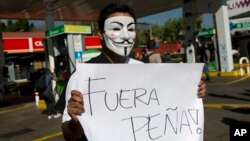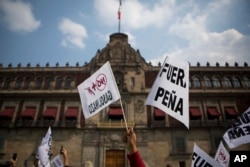Small groups of protesters blockaded some roads and gasoline stations in Mexico on Monday to protest a government price deregulation that sent the price of fuel up by as much as 20 percent over the weekend.
One group blockaded a privately owned gasoline station on Mexico City's main boulevard, shouting: “The people, united, will never be defeated!”
“This will increase the cost of living for all Mexicans. It will make more expensive transportation, basic food stuffs, food, and it will ultimately hit Mexican families,” said Rafael Sotocruz, a nurse who was protesting at the station.
On a busy highway leading into the capital from the west, another group blocked traffic and held up a banner reading “Enough already!”
Reports on social media and local newspaper sites suggested small, intermittent protests popped up at a half dozen other sites across the country.
The Mexican government said the deregulation had long been planned, but unfortunately coincided with rising world oil prices. The deregulation is aimed at ending subsidies that the government says largely benefit wealthier Mexicans and at attracting interest in private participation in the newly opened fuel market
“Unfortunately, it coincided with a significant increase in international oil prices,” said Miguel Messmacher, Mexico's assistant finance secretary.
That, and a drop in the value of the Mexican peso against the dollar in 2016, probably would have resulted in gas price hikes last year, but the government was still setting prices then. Mexico imports much of its gasoline, even though it exports crude oil.
“It was precisely because we were limiting these [price] movements in some ways that gave rise to this pent-up increase,” Messmacher said.
“These things always create bad feelings,” he added. “That is very clear, and very understandable. It is very clear to us that this is obviously an unpopular measure.”
When the deregulation took effect on New Year's Day, protesters snarled traffic on one of the country's main north-south highways.
Gasoline supplies have begun stabilizing after some stations were recently left dry due to what officials described as panic buying, increased holiday demand, unforeseen shipping delays and damage to pipelines that officials blamed on a surge in fuel thefts.
Authorities still haven't explained why pipeline thefts increased so dramatically in early December, but the government was forced to increase military patrols by 60 percent to combat the thefts. Thieves steal about $1.4 billion worth of fuel products annually from pipelines operated by the state oil company, Pemex, according to official estimates.
The 2017 price deregulation is part of a broader overhaul of Mexico's energy sector passed two years ago under President Enrique Pena Nieto allowing some private investment and ending more than seven decades of state monopoly over oil.
In a second phase later this year, other companies will be allowed to begin importing and distributing gasoline instead of Pemex handling the entire supply chain.





